Overview
This article provides a comprehensive overview of the INVIMA requirements essential for conducting medical technology (medtech) clinical trials in Colombia. It delineates the regulatory framework and outlines the critical documentation necessary for obtaining approval. Understanding these requirements is paramount; adherence ensures not only participant safety but also the scientific integrity of the studies. The regulatory authority meticulously evaluates applications, thereby upholding high standards in clinical research.
Introduction
Colombia is rapidly emerging as a key player in the global Medtech landscape, driven by its commitment to regulatory excellence through the National Food and Drug Surveillance Institute (INVIMA). This regulatory authority plays a pivotal role in ensuring the safety, efficacy, and quality of medical devices and pharmaceuticals, making it essential for Medtech companies looking to conduct clinical trials in the region. As the demand for innovative healthcare solutions grows, understanding INVIMA's regulatory framework becomes crucial for navigating the complexities of clinical research in Colombia. With a focus on streamlining processes and aligning with international standards, INVIMA not only fosters a supportive environment for medical innovation but also enhances patient safety and ethical compliance. This article delves into the intricacies of INVIMA's approval process, key requirements for clinical trials, and the essential documentation needed for success, providing valuable insights for Medtech stakeholders eager to tap into Colombia’s promising clinical research landscape.
Overview of INVIMA: Colombia's Regulatory Authority for Medical Devices
The National Food and Drug Surveillance Institute serves as Colombia's primary regulatory authority, dedicated to safeguarding public health by ensuring the safety, effectiveness, and quality of medical devices and pharmaceuticals. Established to uphold stringent health standards, the agency is integral to the approval process for research studies, meticulously evaluating applications to ensure compliance with INVIMA requirements for medtech clinical trials, as well as national and international regulations. This encompasses the oversight of ongoing studies and the enforcement of Good Clinical Practices (GCP).
As a leading contract research organization (CRO) in Latin America, bioaccess® excels in providing tailored solutions for Medtech startups, facilitating their navigation through the regulatory landscape. bioaccess® offers essential services such as regulatory approval, research site activation, participant recruitment, and data management, which are critical for Medtech firms seeking to conduct studies in Colombia. The regulatory framework established by the authority aligns with international standards, which is vital for fostering a robust Medtech environment in the region.
As of 2025, the agency has optimized its processes, reflecting a commitment to efficiency and transparency. Notably, over the past year, the regulatory agency has authorized a significant number of research studies, underscoring its proactive approach to advancing medical innovations. The country’s device classification system operates on a four-tiered risk model:
- Class I
- Class IIa
- Class IIb
- Class III
This aids in categorizing devices according to their risk levels and regulatory obligations.
A recent case analysis involving eyeFlow illustrates the successful execution of medical studies while adhering to INVIMA's requirements for medtech clinical trials, highlighting the potential for Medtech firms to thrive in the country. The combination of a diverse population, proficient research facilities, and a favorable regulatory environment positions Colombia as an attractive destination for U.S. medical device firms looking to conduct research. As Julio G. Martinez-Clark, CEO of bioaccess Colombia, articulates, "This nation’s combination of a large and diverse population, experienced clinical research sites, efficient regulatory processes, a cost-competitive environment, a regionally respected association of clinical research professionals (AVANZAR) collaborating with the government to increasingly attract more foreign investment in clinical research, and a track record of successful medtech clinical trials since 2010, along with meeting INVIMA requirements for medtech clinical trials, make it an appealing choice for U.S. medical device companies looking to conduct clinical research."
Furthermore, the regulatory body underscores the necessity of ongoing compliance, mandating periodic renewals and reporting of any changes to approved devices. This ensures that all medical devices consistently meet safety and efficacy standards throughout their lifecycle. Additionally, Colombia offers R&D tax and financial incentives, including a 100% tax deduction for investments in science, technology, and innovation projects, further enhancing its attractiveness for Medtech companies.
As the landscape of medical device regulation evolves, the organization remains a pivotal player, continuously adapting to meet the industry's needs while prioritizing public health.
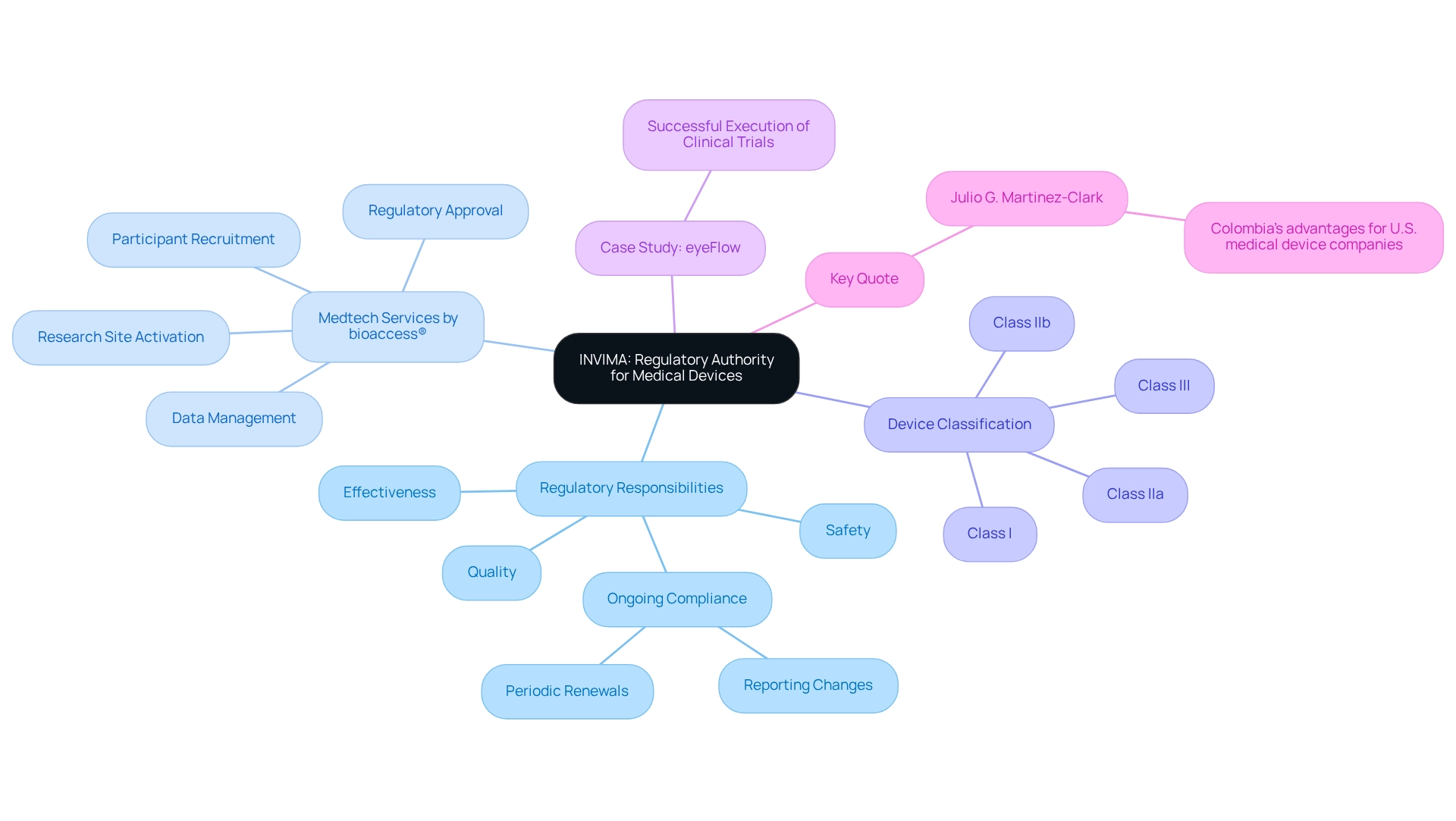
Key Requirements for First-in-Human Clinical Trials Under INVIMA
To commence first-in-human (FIH) clinical studies in Colombia, sponsors must present a comprehensive application to INVIMA, which includes several essential components:
- Study Protocol: A comprehensive study protocol must be included, detailing the study's objectives, methodology, and statistical analysis plan. This document acts as the framework for the experiment, ensuring clarity in the research approach.
- Preclinical Evidence: Sponsors must provide robust evidence from preclinical studies that demonstrate the safety and efficacy of the investigational device. This data is crucial for establishing a foundation for human trials.
- Informed Consent Forms: All informed consent forms must adhere to ethical standards, ensuring that participants are fully aware of the study's nature and any associated risks.
- Risk Assessment Report: A detailed risk assessment report is necessary to identify potential risks to participants, showcasing the sponsor's commitment to participant safety.
- Research Team Qualifications: Documentation outlining the qualifications and experience of the principal investigator and the research team is essential. This guarantees that the examination is carried out by skilled professionals.
- Ethics Committee Approval: Authorization from an independent ethics committee (IEC) or institutional review board (IRB) is essential, indicating the ethical supervision of the study.
Meeting the INVIMA requirements for medtech clinical trials is crucial for obtaining permission from INVIMA to proceed with FIH studies. Significantly, the nation ranks fourth in Latin America for research studies per million individuals, following Chile, Argentina, and Brazil, underscoring its increasing importance in the research landscape. The success rates of research applications submitted to INVIMA have been promising, with a significant rise in the number of first-in-human studies conducted in the country.
Indeed, the medical research sector in the nation has seen more than 6% growth in direct employment over the last five years, further highlighting the country's potential as a center for medical studies. Additionally, experts concur that dropout rates in Latin America are one-third of those in the U.S. and the EU, making this country an appealing choice for sponsors. As Business Monitor observes, the combination of outstanding medical care—where 98% of citizens have health services coverage—and the highest public expenditure on health in the region makes this nation an ideal location for the research industry.
Furthermore, while universities contribute to research, their overall involvement is limited compared to the industry, indicating a need for greater collaboration to address health challenges in developing regions. As best practices develop, sponsors are urged to remain updated on the INVIMA requirements for medtech clinical trials and to utilize the expertise accessible within the region, such as the extensive research management services provided by bioaccess®, including feasibility studies, project management, and compliance reviews, to improve their study outcomes. The partnership with firms such as Flow-FX further demonstrates the practical use of bioaccess's services in real-world contexts, establishing the country as a prominent location for medical studies.
Essential Documentation for INVIMA Approval Process
The documentation necessary to meet INVIMA requirements for medtech clinical trials is crucial for upholding the integrity and safety of clinical studies in Colombia. The essential components include:
- Clinical Trial Application (CTA): This formal request outlines the intent to conduct the study, detailing all pertinent information, including objectives and methodologies.
- Study Protocol: A comprehensive document that outlines the study's design, objectives, methodology, and statistical analysis, ensuring clarity and guidance throughout the research.
- Informed Consent Forms: These documents are essential for guaranteeing that participants are completely aware of the study's nature, their rights, and any potential risks involved.
- Investigator's Brochure: A thorough collection of both medical and non-medical information concerning the investigational device, offering crucial background details for the study.
- Ethics Committee Approval: Evidence of approval from an Independent Ethics Committee (IEC) or Institutional Review Board (IRB) is necessary to demonstrate adherence to ethical standards.
- Quality Management System (QMS) Documentation: This documentation serves as proof that the sponsor complies with established quality standards in clinical research, ensuring reliability and safety.
- Risk Assessment Reports: Comprehensive evaluations of potential hazards linked to the study must be included to proactively address any adverse events before the study commences.
All documents must be submitted in Spanish and comply with the specific formatting and content guidelines of the organization. Notably, data indicate that a substantial proportion of research application submissions to the regulatory agency align with these documentation standards, reflecting the meticulousness of the preparation process. According to a case study titled 'Conclusion on Approval Requirements,' adhering to these guidelines enhances patient safety and the integrity of research studies, facilitating the advancement of medical technologies.
Furthermore, Colombia's cost-competitive environment for medical trials—where procedures can be 40% to 75% less expensive than in the U.S.—improves the feasibility of conducting extensive studies without compromising quality. As David Vizcaya, a full-time employee of Hispania, points out, with the increasing access and use of data sources, it is imperative that the evidence generated is made publicly available and that access to the data is granted to a larger research community. By understanding and adhering to the INVIMA requirements for medtech clinical trials, Medtech companies can effectively navigate the regulatory landscape, which facilitates the advancement of innovative medical technologies.
For thorough assistance in fulfilling regulatory requirements, including feasibility studies, site selection, and setup, reach out to bioaccess today to ensure your studies are successful.
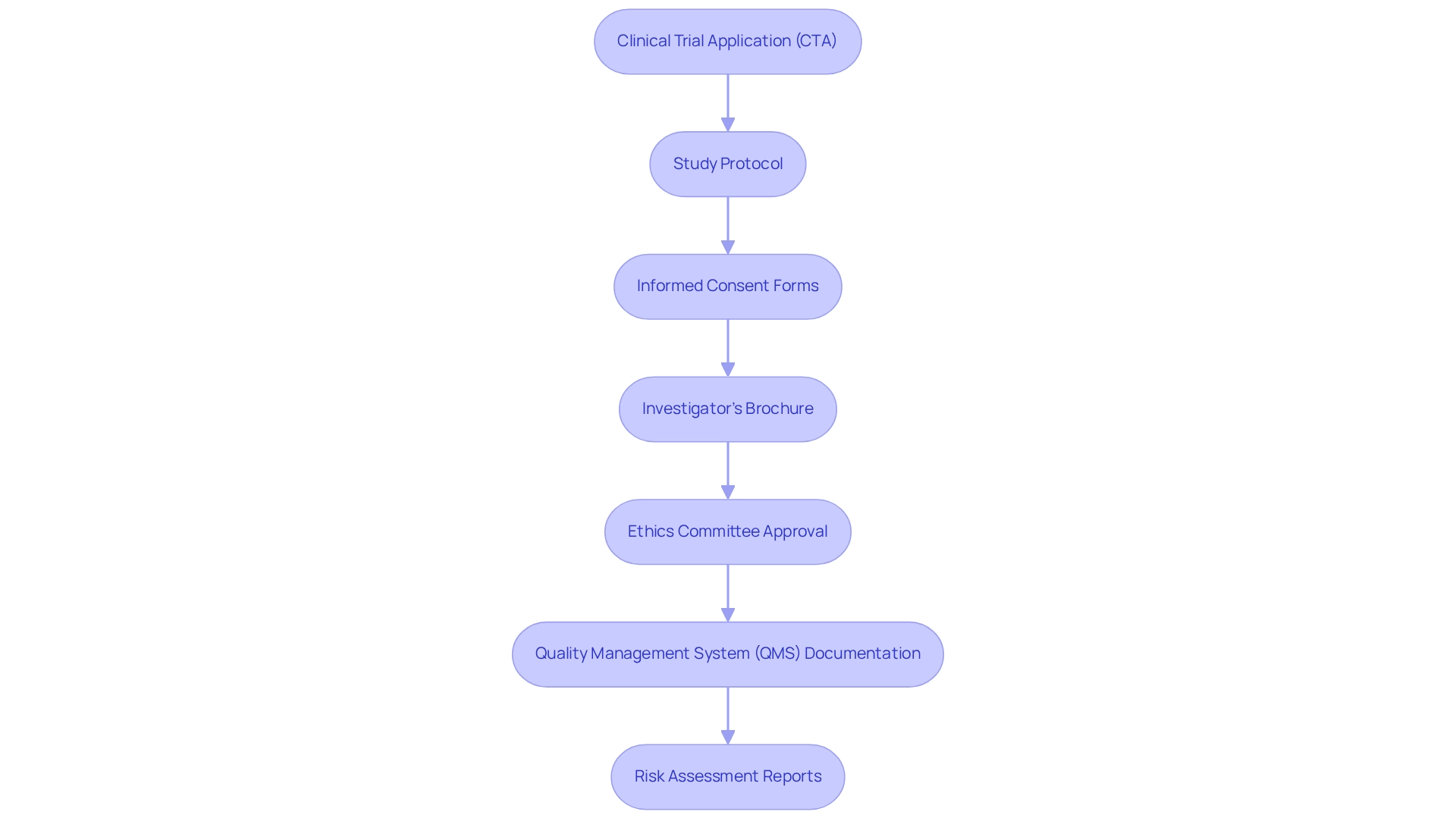
The Evaluation Process: Assessing Scientific Validity and Feasibility
The evaluation process for clinical research applications is a meticulous procedure designed to uphold scientific integrity and participant safety in accordance with INVIMA requirements for medtech clinical trials. This process encompasses several critical steps:
- Initial Review: Upon submission, the agency initiates a preliminary review to confirm that all necessary documents are included, ensuring a complete application.
- Scientific Evaluation: The application undergoes a rigorous assessment for scientific validity. This includes a thorough examination of the study design and methodology, ensuring that the proposed research is robust and capable of yielding reliable results.
- Feasibility Assessment: INVIMA assesses the practicality of carrying out the proposed study within the specified parameters. This evaluation considers elements such as site availability, participant recruitment, and logistical factors, which are vital for the study's success. With bioaccess's extensive experience in feasibility studies and site selection, clients can be assured of a streamlined process.
- Risk-Benefit Evaluation: A thorough examination is performed to balance the possible advantages of the study against the risks faced by participants. This step is vital in ensuring that the rights and well-being of participants are prioritized throughout the research process.
- Final Decision: Following the evaluations, INVIMA makes a final decision regarding the application. This may lead to acceptance, a request for further details, or rejection of the application, based on the outcomes from the earlier stages.
This comprehensive assessment process not only ensures that only scientifically valid and ethically conducted studies meet the INVIMA requirements for medtech clinical trials but also strengthens the country's status as a strategic option for Medtech research. The partnership between bioaccess and Caribbean Health Group seeks to establish Barranquilla as a prominent location for medical studies in Latin America, backed by the nation's Minister of Health. With more than 15 years of experience in the Medtech sector, bioaccess is well-prepared to manage this process, guaranteeing that clients can bring their engineers, physicians, and other pertinent personnel for cases at locations in South America, as mentioned by Dr. Pedro Martinez-Clark, a Harvard-trained interventional cardiologist.
Moreover, Colombia provides substantial cost reductions for studies in comparison to the U.S., making it an attractive choice for Medtech firms looking to perform research and acquire medical information. The nation's well-equipped healthcare system and dedication to promoting innovation establish a favorable setting for carrying out medical research, making it an appealing location for Medtech firms aiming to enhance their products efficiently.
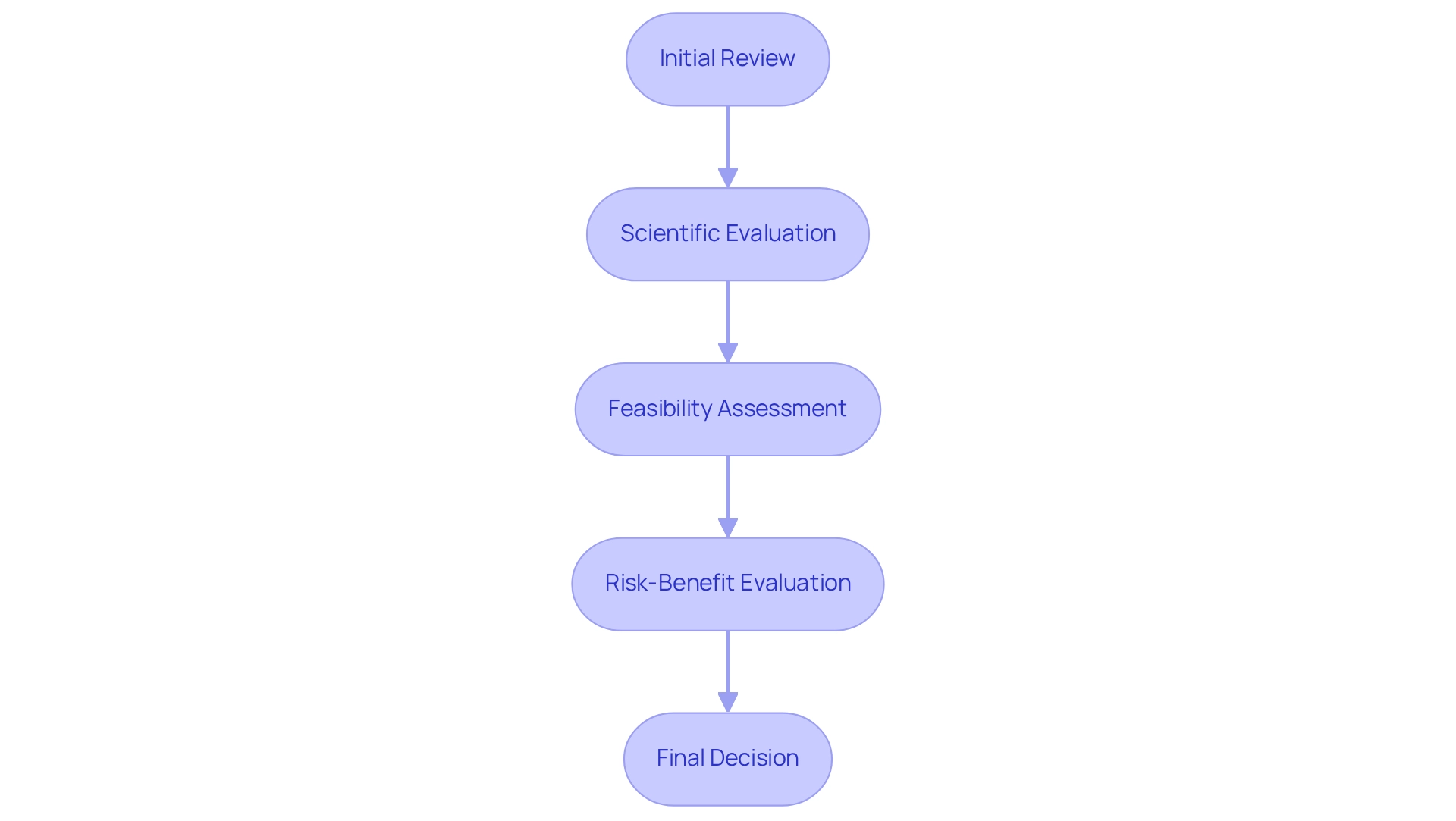
Ethical Considerations in INVIMA's Approval Process
Ethical factors are paramount to the INVIMA requirements for medtech clinical trials, ensuring that clinical studies are conducted with the utmost integrity and participant safety. Key aspects include:
-
Informed Consent: Participants must be thoroughly informed about the study's nature, including potential risks and benefits. This process must guarantee that consent is obtained voluntarily, free from coercion. A meta-analysis on informed consent comprehension revealed that while 75.8% of participants understood their right to withdraw, only 52.1% grasped the concept of randomization. This highlights the urgent need for improved communication strategies by researchers to enhance participant comprehension of study protocols.
-
Participant safety is critical, and the INVIMA requirements for medtech clinical trials stipulate that the safety and well-being of participants must be prioritized in all studies. This includes implementing robust protocols for monitoring adverse events, which are essential for maintaining participant trust and ensuring ethical compliance. Reports indicate that a significant number of negative occurrences are recorded during research studies, underscoring the necessity for careful supervision.
-
Ethics Committee Review: All clinical research applications must receive approval from an independent ethics committee. This committee plays a vital role in assessing the ethical implications of the study, ensuring that all elements of the research adhere to established ethical standards. Insights from ethics committee members stress the importance of participant safety, with one member stating, "Something that I would not approve of is to leave the broad informed consent like a blank check." Notably, the COVID-19 pandemic prompted ethics review committees to modify procedures for expedited review and data sharing, reflecting the need for adaptability in ethical oversight.
-
Vulnerable Populations: Special considerations are mandated for vulnerable groups, ensuring that additional protections are in place to safeguard their rights and welfare. This is particularly significant in experiments involving groups that may be at higher risk of exploitation or harm.
-
Openness and Responsibility: Researchers must adhere to the INVIMA requirements for medtech clinical trials, which mandate transparency in reporting study results and any potential conflicts of interest. This commitment to accountability is crucial for fostering trust in the research process and ensuring that results are reported accurately and ethically.
In addition to these ethical standards, bioaccess provides comprehensive research study management services that encompass feasibility assessments, site selection, compliance evaluations, setup, import permits, project management, and reporting. These services are designed to effectively navigate the complexities of regulatory standards. For instance, the research protocol received approval from the Ethics Review Committee of the Centro de Atención de Diagnóstico de Enfermedades Infecciosas in Bucaramanga, exemplifying the rigorous ethical examination that medical studies undergo.
These ethical standards are intended to uphold the integrity of medical research and safeguard participants throughout the study process, reflecting the organization's commitment to ethical excellence in research in Colombia.
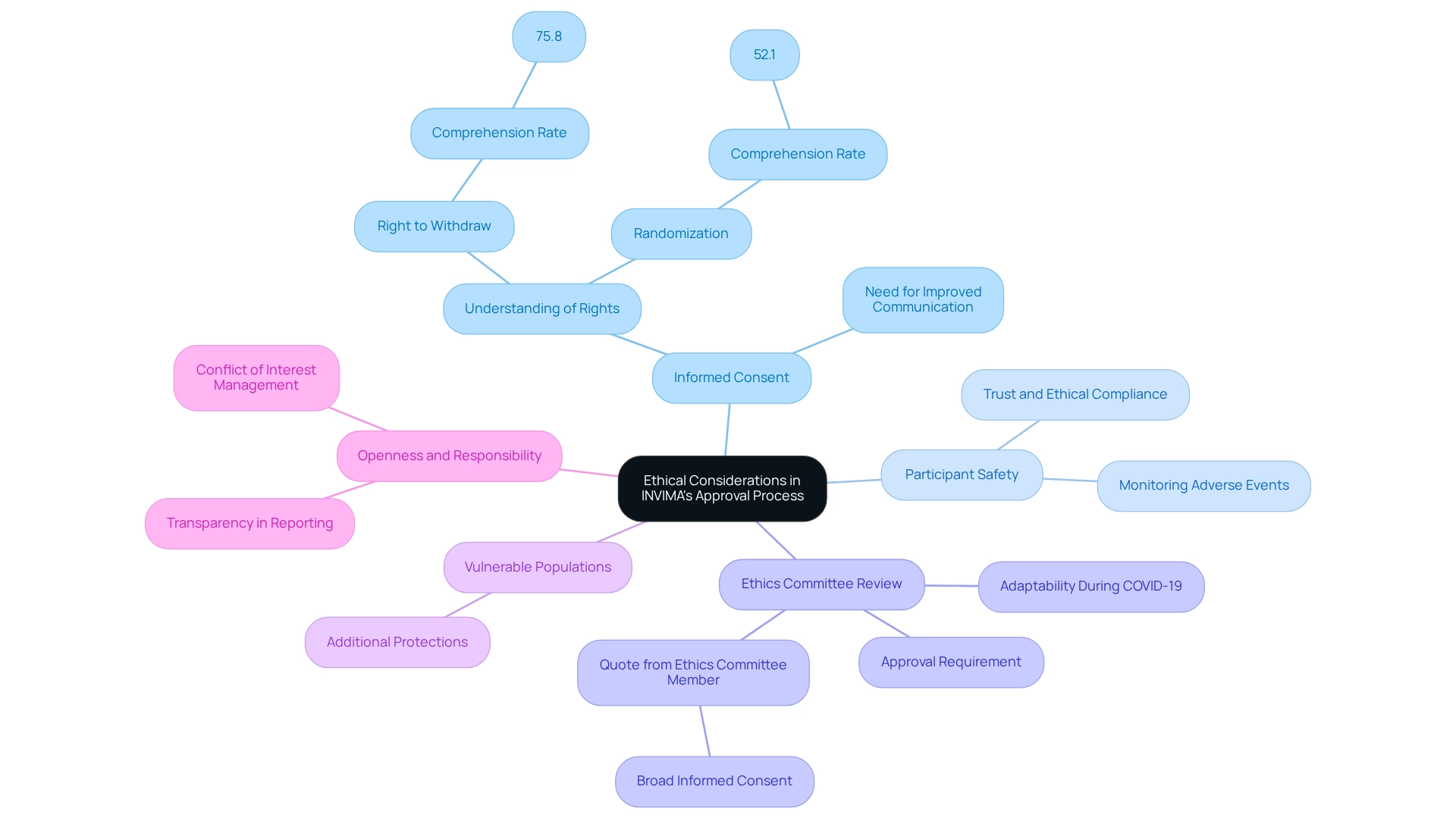
Understanding the Timeline for INVIMA Approval
The schedule for regulatory approval is influenced by several factors, including the complexity of the clinical study and the completeness of the submitted documentation. The approval process typically unfolds in several key stages:
- Initial Review: This phase lasts between 15 to 30 days, during which the agency conducts a preliminary assessment of the application.
- Scientific and Feasibility Evaluation: Following the initial review, a detailed evaluation of the scientific validity and feasibility of the trial takes place, generally requiring 30 to 60 days.
- Final Decision: The agency communicates its decision regarding the application within an additional 15 to 30 days.
In total, Medtech companies can expect that the entire approval process will take approximately 2 to 4 months. However, this timeline may extend if the INVIMA requirements for medtech clinical trials involve requests for additional information or if the application presents particular complexities.
Recent government initiatives aimed at reducing the evaluation and approval process for study protocols have significantly enhanced the efficiency of this process. For instance, the typical approval timeframe has been shortened from 135 days to only 60 days, making the country an increasingly attractive site for research studies. This reduction results in cost savings exceeding 30% when compared to conducting experiments in the U.S. and Europe, positioning the country as a competitive choice in the global Medtech landscape.
As of 2025, the nation ranks sixth in research studies within Latin America, comprising 5.9% of examinations in the region. Paul Toralva, director of site oversight in Peru and another South American country, highlights this achievement, stating, "This nation is ranked sixth in research within Latin America, with 5.9% of studies." This statistic underscores the growing recognition of Colombia as a viable center for medical research, particularly for innovative Medtech firms addressing the INVIMA requirements for medtech clinical trials.
At bioaccess®, we provide comprehensive management services for studies, including feasibility assessments, site selection, compliance evaluations, setup, import permits, project oversight, and reporting on study progress. Our expertise ensures that Medtech firms can effectively navigate the approval process, ultimately contributing to job creation, economic development, and healthcare enhancement in the region.
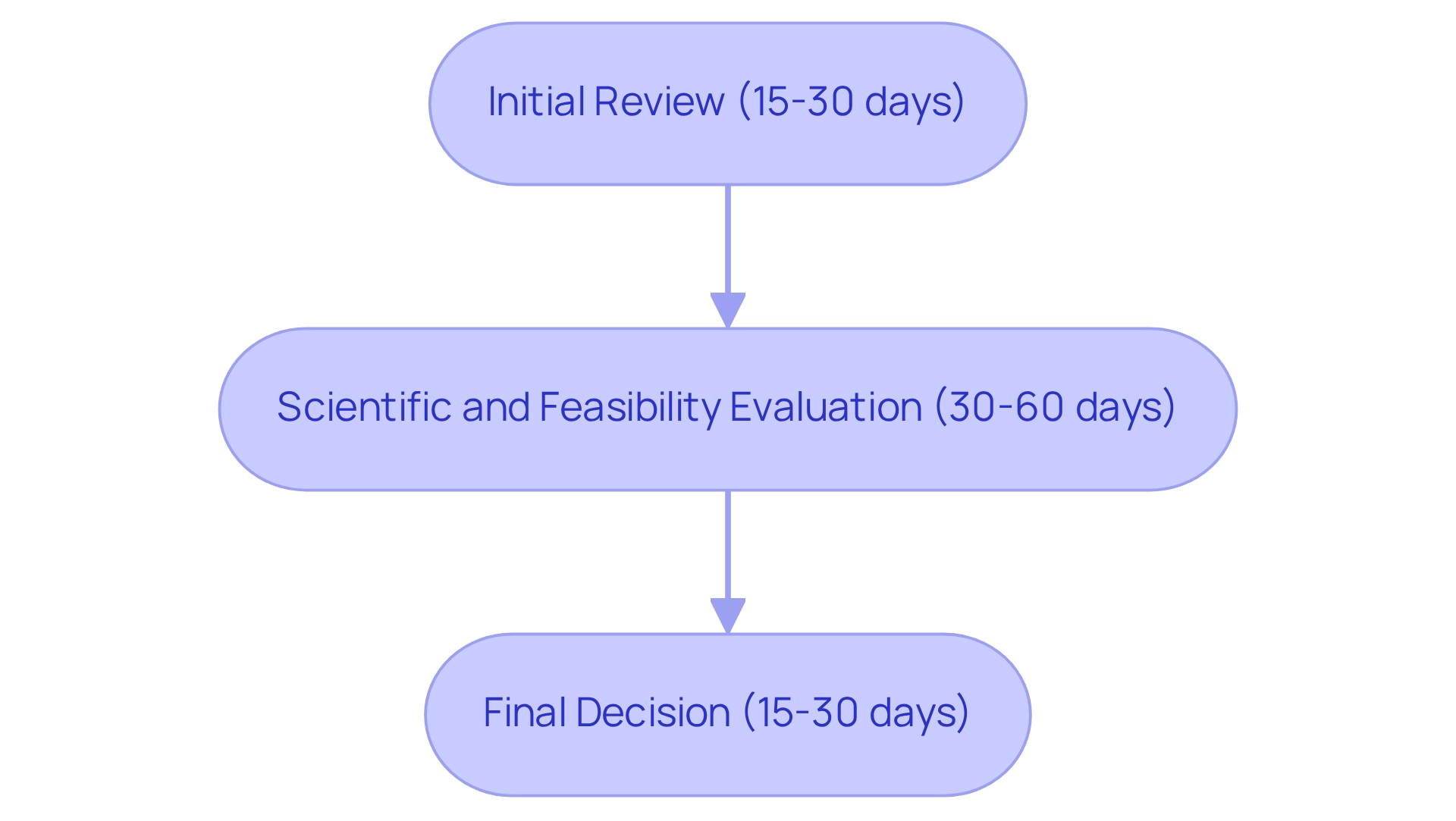
Ensuring Patient Safety: INVIMA's Approach in Clinical Trials
INVIMA implements a comprehensive array of strategies to ensure patient safety during research studies.
- Rigorous Review Process: Each trial application undergoes a meticulous review process aimed at evaluating potential risks and confirming that adequate safety measures are in place. This thorough assessment is essential for upholding high standards in clinical research and aligns with bioaccess®'s objective of advancing medical devices more rapidly through expertise and a tailored approach, all while adhering to INVIMA's requirements for medtech clinical trials.
- Monitoring Adverse Events: Continuous monitoring of participants for adverse events is a fundamental requirement established by INVIMA. This includes established protocols for the prompt reporting and management of any issues that may arise during the study, ensuring that participant safety remains a foremost priority. The emphasis on systematic recording and reporting of adverse drug events (ADEs) is crucial for fulfilling INVIMA's requirements for medtech clinical trials, ultimately enhancing patient safety and informing healthcare practices.
- Ethics Committee Oversight: Independent ethics committees play a vital role in the research process, tasked with assessing the ethical dimensions of each study. Their oversight guarantees that the rights and welfare of participants are safeguarded throughout the research. As highlighted by Mayerlys Martínez from the Department of Pharmacy at Universidad de Cordoba, the commitment to ethical practices is fundamental for maintaining trust in research trials.
- Training and Certification: The regulatory authority mandates that all research personnel comply with INVIMA's requirements for medtech clinical trials by undergoing rigorous training in Good Clinical Practice (GCP) and ethical research methodologies. This training is vital for equipping staff with the necessary knowledge and skills to conduct experiments safely and ethically. The number of training initiatives organized for research personnel by the regulatory authority continues to progress, addressing the essential demand for effective pharmacovigilance in Colombia's healthcare landscape.
- Public Transparency: To foster accountability, the agency requires that all study results be made publicly accessible. This transparency allows for independent examination of safety and efficacy information, thereby enhancing confidence in the research process. Collectively, these actions create a robust framework aimed at protecting participants in studies, ensuring compliance with INVIMA's requirements for medtech clinical trials, and demonstrating the organization's commitment to patient safety and regulatory excellence.
In 2025, the focus on overseeing adverse occurrences and enhancing training initiatives for research staff continues to evolve, addressing the critical need for effective pharmacovigilance in the healthcare environment. The challenges highlighted in the case study on pharmacovigilance programs underscore the significance of these measures in rectifying deficiencies and improving patient safety. Furthermore, bioaccess® offers extensive clinical trial management services, including feasibility studies, site selection, compliance reviews, and project management, all of which adhere to local regulations and enhance the overall safety and efficacy of clinical trials.
Collaboration and Global Standards: Enhancing Regulatory Efficiency
The agency actively collaborates with international regulatory organizations to enhance the effectiveness of its processes, positioning the nation as a competitive player in the Medtech landscape. Key aspects of this collaboration include:
- Adoption of International Guidelines: The agency aligns its regulations with global standards established by organizations such as the World Health Organization (WHO) and the International Council for Harmonization (ICH). This alignment guarantees that research studies conducted in Colombia meet the INVIMA requirements for medtech clinical trials, thereby enhancing the region's credibility for Medtech innovations.
- Training and Capacity Building: The organization has participated in numerous training programs and workshops with global partners, aimed at refining its regulatory practices. These initiatives not only bolster the agency's capabilities but also enhance the overall quality of clinical research in the region, supporting bioaccess®'s commitment to regulatory excellence in Medtech clinical research.
- Harmonization of Processes: By aligning its approval procedures with those of other nations, the organization facilitates smoother submissions for Medtech companies operating across multiple jurisdictions. This harmonization is crucial for expediting the entry of innovative medical devices into the market, ultimately benefiting local economies through job creation and healthcare improvements.
- Stakeholder Engagement: The organization actively engages with industry stakeholders, including Medtech companies and research organizations, to gather feedback and refine regulatory frameworks. This collaborative dialogue ensures that the regulations remain relevant and responsive to the needs of the industry, fostering an environment conducive to innovation.
- Continuous Improvement: Dedicated to ongoing assessment and advancement of its regulatory processes, the organization adapts to emerging trends and technologies within the Medtech sector. This proactive approach not only improves regulatory efficiency but also fosters innovation, ultimately benefiting public health.
The Directorate for Medical Devices and other Technologies within the agency plays a crucial role in monitoring and controlling medical devices, suggesting technical standards, and ensuring compliance with health regulations. The joint initiatives of the organization have resulted in notable advancements in regulatory structures throughout Latin America, positioning the area as a key center for research involving human subjects. For example, the ethics committee evaluation of research documentation usually requires between 4 to 6 weeks, demonstrating the organization's dedication to prompt and effective regulatory supervision.
Additionally, the agency's partnership with global regulatory organizations has been crucial in ensuring that the INVIMA requirements for medtech clinical trials conform to international standards, thereby improving the region's credibility and appeal for research studies. As Julio G. Martinez-Clark notes, "Looking for a reliable Contract Research Organization (CRO) in Latin America? Explore Colombia's regulatory requirements for the approval of first-in-human medical device clinical trials." Furthermore, it is crucial for Medtech firms to understand post-marketing surveillance responsibilities, which involve tracking the safety and effectiveness of medical devices after authorization, including notifying authorities of adverse events.
This comprehensive approach underscores INVIMA's role in fostering a robust regulatory environment that supports innovation and public health.
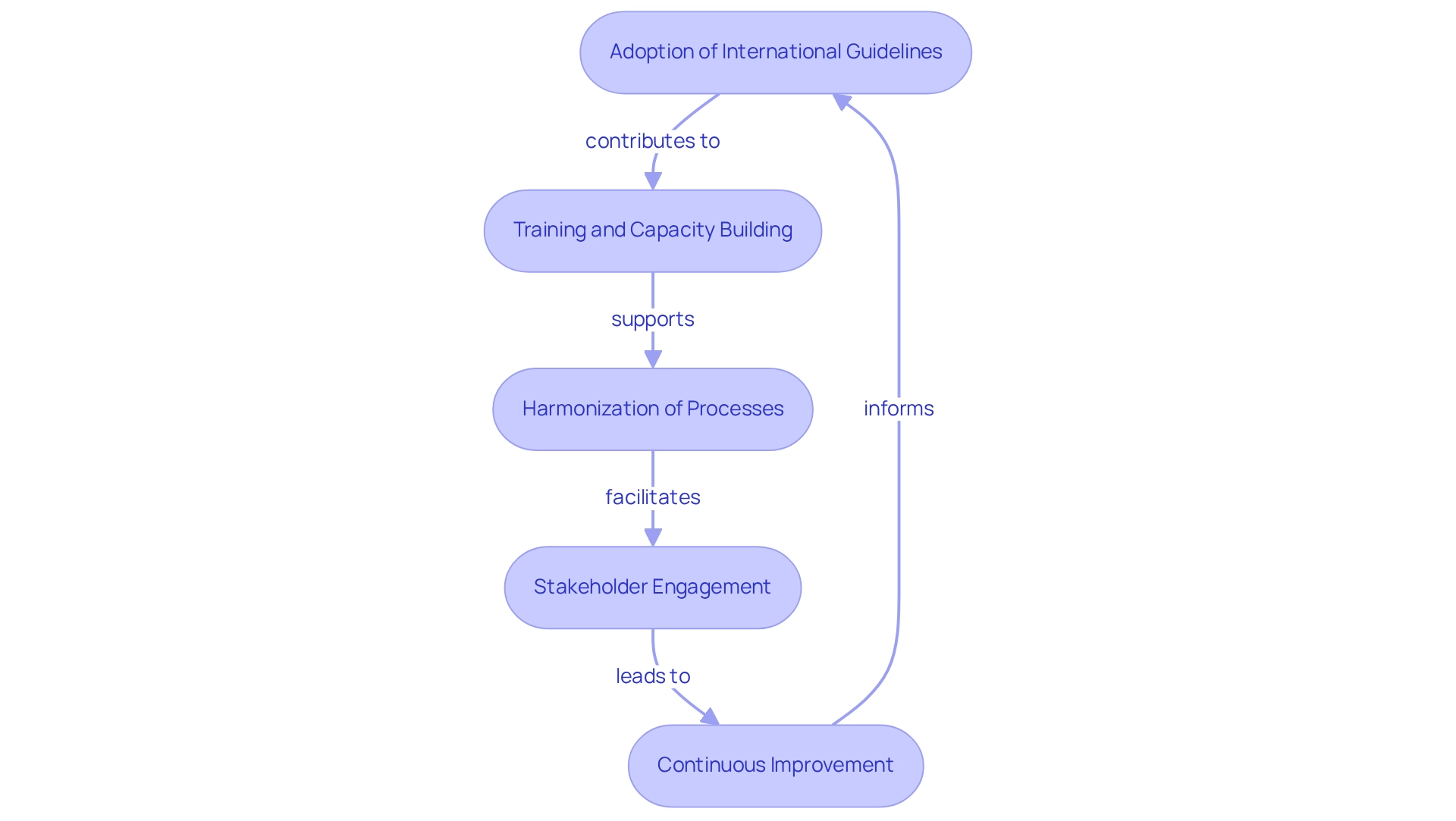
Conclusion
Colombia's emergence as a significant player in the global Medtech landscape is primarily due to the robust framework established by the National Food and Drug Surveillance Institute (INVIMA). By ensuring the safety, efficacy, and quality of medical devices and pharmaceuticals, INVIMA not only streamlines the clinical trial approval process but also aligns with international standards. This alignment fosters a conducive environment for medical innovation. The meticulous evaluation process, which includes thorough documentation and ethical considerations, reinforces the integrity of clinical trials, safeguarding participant welfare.
The comprehensive requirements for first-in-human trials, coupled with an emphasis on ethical practices, underscore Colombia's commitment to maintaining high standards in clinical research. With an increasing number of clinical trials and a supportive regulatory landscape, the country positions itself as an attractive destination for Medtech companies. Collaborative efforts between INVIMA and global regulatory bodies further enhance the credibility and efficiency of the approval process, facilitating the entry of innovative medical technologies into the market.
As the clinical research landscape continues to evolve, understanding INVIMA’s regulatory framework is essential for Medtech stakeholders aiming to navigate the complexities of conducting trials in Colombia. With the promise of cost-effective solutions and a diverse patient population, Colombia is poised to become a leading hub for clinical research, offering significant opportunities for growth and innovation in the Medtech sector. The future of medical technology in Colombia appears bright, driven by a steadfast commitment to regulatory excellence and patient safety.
Frequently Asked Questions
What is the role of the National Food and Drug Surveillance Institute (INVIMA) in Colombia?
INVIMA is Colombia's primary regulatory authority dedicated to safeguarding public health by ensuring the safety, effectiveness, and quality of medical devices and pharmaceuticals. It evaluates applications for research studies to ensure compliance with national and international regulations.
What services does bioaccess® provide for Medtech startups in Colombia?
bioaccess® offers tailored solutions including regulatory approval, research site activation, participant recruitment, and data management, which are essential for Medtech firms conducting studies in Colombia.
How has the regulatory process in Colombia changed as of 2025?
As of 2025, INVIMA has optimized its processes to enhance efficiency and transparency, leading to a significant number of authorized research studies and a proactive approach to advancing medical innovations.
What is the device classification system in Colombia?
Colombia's device classification system operates on a four-tiered risk model: Class I, Class IIa, Class IIb, and Class III, which categorizes devices according to their risk levels and regulatory obligations.
What are the requirements for commencing first-in-human (FIH) clinical studies in Colombia?
Sponsors must submit a comprehensive application that includes a study protocol, preclinical evidence, informed consent forms, a risk assessment report, research team qualifications, and ethics committee approval.
Why is Colombia considered an attractive destination for U.S. medical device firms?
Colombia's large and diverse population, efficient regulatory processes, experienced clinical research sites, and financial incentives, such as R&D tax deductions, make it an appealing choice for conducting clinical research.
What is the significance of ongoing compliance in the regulatory framework?
Ongoing compliance requires periodic renewals and reporting of changes to approved devices, ensuring that medical devices consistently meet safety and efficacy standards throughout their lifecycle.
How has the medical research sector in Colombia performed recently?
The medical research sector has seen over 6% growth in direct employment over the last five years, and the success rates for research applications submitted to INVIMA have increased, indicating a growing importance in the research landscape.




